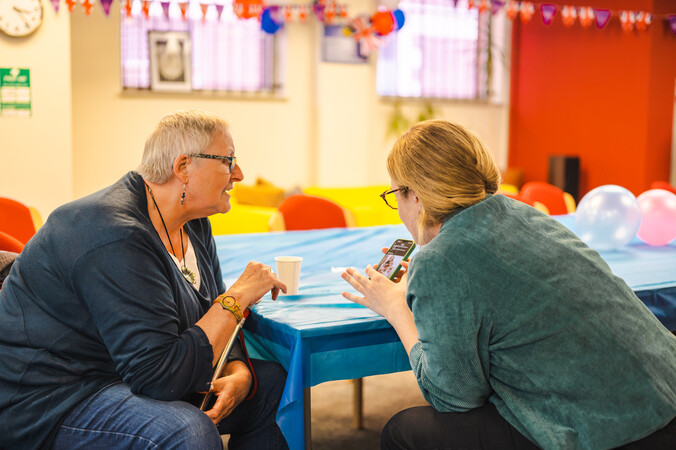Hi there, i’m a researcher designing for our complex health and ageing futures
Empowering Senior Voices
Co-Investigator, RMIT University
2025
Co-Investigator, RMIT University
2025
A City North Activation Initiative in Melbourne, Empowering Seniors Voices ︎ use Standford’s Our Voice Discovery tool to document features of the communities that impact older adults ability to lead healthy lives. Through photowalks, stakeholder workshops, and interactive exhibits, explore inclusive, age-friendly neighbourhoods through participatory civic data and storytelling.

New Models of Long COVID Care
Research Fellow, RMIT University
2025 - Present
Research Fellow, RMIT University
2025 - Present
As part of the Long COVID Assessment Management and Practice (LAMP) project ︎, I am exploring the experiences of people with long-COVID alongside medical and allied health professionals. Taking an experience-based co-design approach, the aim of this research project is to drive more inclusive models of care for those living with long COVID. Part of the Eat Move Heal Network ︎

Enhancing Networks of Care
Research Fellow, University of Edinburgh
2023 - 2025
Research Fellow, University of Edinburgh
2023 - 2025
As part of the Advanced Care Research Centre ︎, I coordinated a work package component that investigated the role of community-led, service-enabled, and technology-driven care networks. Focusing on supporting healthier and more resilient networks of care, I was situated within the Institute for Design Informatics ︎

Designing for Social Engagement in Later Life
PhD Researcher, RMIT University
2019 - 2023
PhD Researcher, RMIT University
2019 - 2023
Designing social engagement technologies with older Australians, my doctorate demonstrated how modes of interpretative flexibility can support interaction designers in co-creating with ageing communities.

Journey Mapping Long COVID
Research Assistant, RMIT University
2022
Research Assistant, RMIT University
2022
Recognising the lack of understanding around the experiences of people with long COVID, I supported a 3-month study mapping patients' experiences, as part of the multi-school, multi-college collaborative Eat Move Heal Network ︎. Our longitudinal mixed methods analysis highlighted the role of agency and social support in their lives
2025, Poster
Understanding the Impacts and Experiences of Long COVID and Invisible Illness on
Australians ︎
Sheahan, J., Jovanovski, N., Anderson, K., Seal, E.S., Seeley, M.C., Cleary, S., Xenos, S.
Long COVID Conference 2025, La Trobe University
Understanding the Impacts and Experiences of Long COVID and Invisible Illness on
Australians ︎
Sheahan, J., Jovanovski, N., Anderson, K., Seal, E.S., Seeley, M.C., Cleary, S., Xenos, S.
Long COVID Conference 2025, La Trobe University
Experiences of this condition align with other invisible illnesses, chronic health conditions that are not immediately visible to others but significantly affect a person's daily life. To better understand individual lived experiences, we interviewed 20 people with Long COVID, 10 with similar hidden illnesses and 10 carers. We sought to capture the impact of the condition(s) on their lives, understand individual health service needs, and the barriers they have faced accessing appropriate support.
2025, Article
Towards a Strengths-based PEER Framework: How peer learning behaviours help develop ICT competencies in older adults ︎
Figueiredo, B., Luu, N., Buschgens, M., Aleti, T., Sheahan, J., Martin, D.M., Hjorth, L., Reid, M.
Behaviour & Information Technology
Towards a Strengths-based PEER Framework: How peer learning behaviours help develop ICT competencies in older adults ︎
Figueiredo, B., Luu, N., Buschgens, M., Aleti, T., Sheahan, J., Martin, D.M., Hjorth, L., Reid, M.
Behaviour & Information Technology
This study takes a strengths-based approach, focusing on older adults’ capabilities and agency in peer-led ICT learning environments. Drawing on qualitative data from observations and interviews with learners and peer tutors at an older adult learning organisation, we identify four key strengths-based behaviours, forming the PEER framework. Our findings demonstrate how peer learning can empower older adults and offer theoretical and practical contributions to the design of ICT programmes that build on older adults’ strengths.
2025, Article
Older Adults’ Digital Competency, Digital Risk Perceptions & Frequency of Everyday Digital Engagement ︎
Aleti, T., Figueiredo, B., Reid., M., Martin, D., Sheahan, J., Hjorth, L.
Information Technology & People
Older Adults’ Digital Competency, Digital Risk Perceptions & Frequency of Everyday Digital Engagement ︎
Aleti, T., Figueiredo, B., Reid., M., Martin, D., Sheahan, J., Hjorth, L.
Information Technology & People
This study explores digital risk perceptions – the perception of risk related to digital environments – among older adults. Specifically, it investigates how these risk perceptions influence older adults' frequency of digital engagement in everyday activities. The study identified six distinct categories of digital risk perceptions among older adults. Furthermore, it found that older adults' digital competencies significantly impacted the frequency of everyday digital engagement.
2025, Article
Playing with persona: Highlighting older adults’ lived experience with digital media ︎
Hjorth, L., Sheahan, J., Figueiredo, B., Martin, D., Reid, M., Aleti, T., Buschgens, M.
Convergence
Playing with persona: Highlighting older adults’ lived experience with digital media ︎
Hjorth, L., Sheahan, J., Figueiredo, B., Martin, D., Reid, M., Aleti, T., Buschgens, M.
Convergence
In this paper, we focus on the six co-design workshops in which we deployed personas as representations of digital experience to challenge, explore, provoke and help build nuanced tools for implementation. Through personas, speculative fiction and lived experience collide, offering some fascinating ways to rethink the digital-social dimension for older adults now and into the future.
2024, Special Issue
Connecting Older Adults to the Digital World ︎
Figueiredo, B., Sheahan, J.
Social Sciences
Connecting Older Adults to the Digital World ︎
Figueiredo, B., Sheahan, J.
Social Sciences